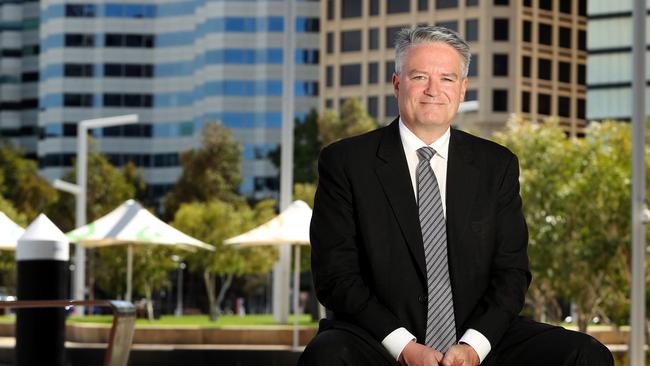Mathias Cormann warns against prolonged stimulus, excessive debt
The OECD secretary-general says it will damage economic growth in the long run, and called for better monitoring of increasingly ambitious promises to cut carbon dioxide emissions.

OECD secretary-general Mathias Cormann has warned governments against prolonged stimulus and excessive debt that would damage economic growth in the long run, and called for better monitoring of increasingly ambitious promises to cut carbon dioxide emissions in the lead-up to the Glasgow climate conference.
Mr Cormann, visiting Washington last week to meet US Climate Change Envoy John Kerry, said Australia had met its emissions reduction targets and could “absolutely get to net zero emissions by 2050”, adding that taking “action on climate change” was now “mainstream as it should be”.
The Morrison government has been under pressure to commit Australia formally to “net zero by 2050” after the US, Japan and other nations rolled out more ambitious emission reductions targets for 2030 at President Joe Biden’s April climate conference.
“It is critically important to better track outcomes achieved, not just commitments made; we need more standardised, objectively comparable data,” he said, calling for “better reporting of progress”.
The Biden administration has promised to cut emissions by at least 50 per cent by 2030.
Maintaining “blanket support for too long” risked weakening long-term economic growth and “slowing down the necessary reallocation of capital and labour across the economy”, Mr Cormann told The Australian.
“In time it will be important to recommit to the important task of budget and balance sheet repair to strengthen resilience in the face of inevitable future shocks or headwinds,” he added.
Australia’s public debt is on track to rise by more than any other developed nation over the three years to 2022, to the tune of about $590bn, according to the International Monetary Fund’s April and most recent global debt outlook.
Australia’s longest-serving finance minister until he was appointed OECD secretary-general in March, Mr Cormann spent four days in the US for talks with Federal Reserve chairman Jerome Powell, National Security Adviser Jake Sullivan and senior White House officials at a dinner hosted by Australian ambassador Arthur Sinodinos.
He stressed withdrawal of support “too soon risked jeopardising the recovery”, given “significant health-related downside risks”.
Global pandemic support over the past year exceeds $US16 trillion, most borrowed or funded by central banks’ money creation policies.
“Where activity has resumed, market mechanisms should start operating more fully, facilitating the movement of workers and resources from unviable to thriving activities,” Mr Cormann said.
The federal government has ruled out further JobSeeker-style support in the midst of another round of lockdowns in NSW and Victoria.
Asked whether Covid-19 restrictions risked sabotaging civil liberties in the long term, a concern that appears to have drawn tens of thousands of people to the streets in recent months throughout OECD nations, Mr Cormann said “the preservation of individual liberty” was a “core mission” of the OECD.
“I hope that as a people, we will continue to reflect on what freedom has helped us achieve, individually and collectively, and that we continue to value the importance of freedom and all it has and will bring to us and to future generations,” he said.
The OECD and the US earlier this month orchestrated a historic global minimum tax deal among 130 countries that would see company profits taxed at a minimum of 15 per cent.
Yet to be legislated, it is expected to generate an extra $US150bn a year in tax revenue including and an extra $2bn to $3bn for the Australian government.
The deal, which also redistributes the profits of tech giants toward the jurisdictions where their customers live, would kill the business model of Caribbean islands such as Barbados and British Virgin Islands, which have lured profits with zero or near zero corporate tax rates for decades.
“Clearly it will impact those businesses using Caribbean tax havens to minimise tax, but it won’t impact businesses motivated by non-tax reasons to base themselves in those jurisdictions,” Mr Cormann said.
“Any business seeking to minimise or reduce their tax liability outside their home jurisdiction to zero will be liable to pay at least 15 per cent effective corporate income tax in their home jurisdiction,” he explained.
Australia’s 30 per cent corporate tax rate wouldn’t be affected by the agreement and the deal excludes “extractive” industries and banks, which means the profits of Australia’s mineral exports and banks wouldn’t be reallocated to other nations.
Mr Cormann denied that the agreement would throttle tax competition, which has seen nations such as Ireland, The Netherlands and Singapore attract businesses, arguing that it would provide “much-needed certainty and stability to the international tax system”.




To join the conversation, please log in. Don't have an account? Register
Join the conversation, you are commenting as Logout